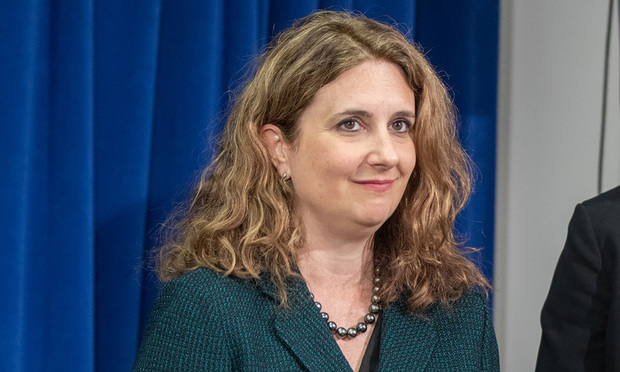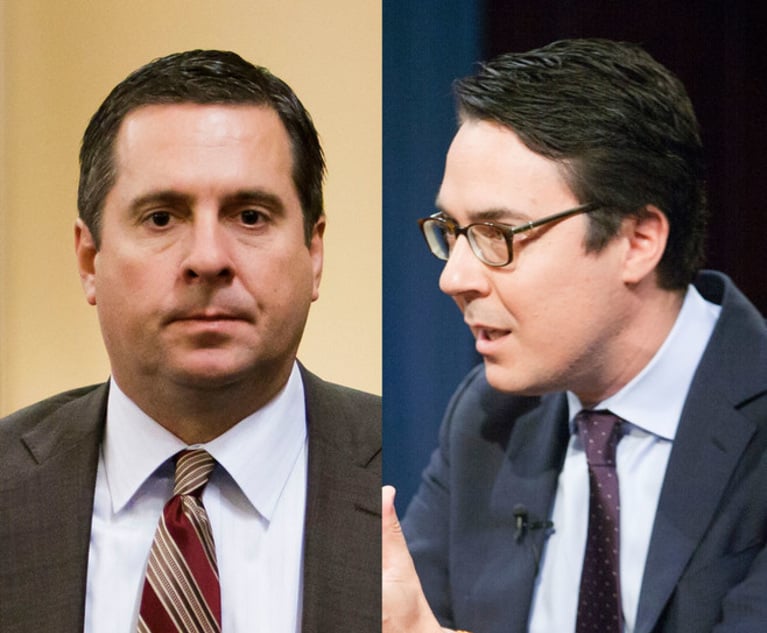Roundup Judge Sanctions Another Plaintiffs Attorney
U.S. District Judge Vince Chhabria on Tuesday found that Jennifer Moore “intentionally joined in the bad faith misconduct” that prompted him to sanction lead plaintiffs counsel Aimee Wagstaff in the second trial over Roundup.
May 21, 2019 at 02:23 PM
4 minute read
 Jennifer Moore, of the Moore Law Group in Kentucky, after her team's $80 million verdict against Monsanto on March 27, 2019.
Jennifer Moore, of the Moore Law Group in Kentucky, after her team's $80 million verdict against Monsanto on March 27, 2019.
A federal judge has sanctioned a second lawyer who “intentionally joined in the bad faith misconduct” during opening statements of a trial against Monsanto Co. over its herbicide Roundup.
On Tuesday, U.S. District Judge Vince Chhabria of the Northern District of California sanctioned Jennifer Moore, co-lead trial counsel in the second trial over Roundup. The order follows a Feb. 26 decision in which Chhabria sanctioned plaintiffs attorney Aimee Wagstaff, of Andrus Wagstaff in Lakewood, Colorado, for “obvious violations” of his pretrial orders during her opening statement. At that time, he ordered Wagstaff to provide the names of other attorneys who worked with her on that opening statement, which she did last month.
On Tuesday, Chhabria concluded that Moore “intentionally joined in the bad faith misconduct for which Wagstaff was sanctioned.” As he did with Wagstaff, Chhabria ordered Moore to pay $500.
“I strongly disagree with the court's order,” wrote Moore, of the Moore Law Group in Louisville, Kentucky, in an email. “There is no legal or factual basis for sanctioning Ms. Wagstaff or me and we are considering our options.”
But Chhabria declined to sanction the other five attorneys on the plaintiffs' trial team, finding he could not “determine with sufficient confidence” whether they had “intentionally committed misconduct.”
Those attorneys were Michael Baum and R. Brent Wisner, partners at Baum Hedlund Aristei & Goldman in Los Angeles; Mark Burton, of counsel at San Francisco's Audet & Partners; and David Wool and Kathryn Forgie of Andrus Wagstaff.
Wisner declined to comment. The other lawyers did not respond to a request for comment.
The trial, which was the first in the federal multidistrict litigation over Roundup, involved plaintiff Edwin Hardeman, who is in remission from non-Hodgkin lymphoma allegedly caused after he used Monsanto's herbicide to clear poison oak from his property.
A jury awarded an $80 million verdict for Wagstaff's client March 27. It was the second award against Monsanto, now owned by Bayer AG, with the first ending in a $289 million verdict last year in San Francisco Superior Court. A third trial ended this month when a jury in Alameda County Superior Court awarded $2 billion to a California couple who both had non-Hodgkin lymphoma.
Lawyers on the plaintiffs' team in the trial before Chhabria had submitted their responses to his sanctions probe under seal. In Tuesday's order, Chhabria, after reviewing those documents, found that Moore played a more active role than the other attorneys did in finalizing the opening statement in the days before the trial began.
“It is clear from the attorney submissions—particularly Wool's—that the issue of violating the court's pretrial rulings was very much on the team's radar as of at least February 23rd, but that did not prevent Moore and Wagstaff from going forward with an opening statement that so obviously violated those pretrial rulings,” he wrote.
Wagstaff previously insisted in court documents last month that she had “ultimate decision making responsibility” as to trial strategy, and had not presented the opening statement “in bad faith.” She urged Chhabria not to sanction any member of her trial team.
Moore, at a hearing over Wagstaff's sanctions in February, defended the opening statement in light of the “unique nature of this trial.” Chhabria had bifurcated the trial so that the first phase focused on whether Hardeman's use of Roundup caused his non-Hodgkin lymphoma, while a second phase would address Monsanto's conduct.
This content has been archived. It is available through our partners, LexisNexis® and Bloomberg Law.
To view this content, please continue to their sites.
Not a Lexis Subscriber?
Subscribe Now
Not a Bloomberg Law Subscriber?
Subscribe Now
NOT FOR REPRINT
© 2025 ALM Global, LLC, All Rights Reserved. Request academic re-use from www.copyright.com. All other uses, submit a request to [email protected]. For more information visit Asset & Logo Licensing.
You Might Like
View All
Devin Nunes, Former California GOP Congressman, Loses Move to Revive Defamation Suit
6 minute read
'Close Our Borders?' Senate Judiciary Committee Examines Economics, Legal Predicate for Mass Deportation Proposal
3 minute read
A Judge Asks: Is It Time to End Ken Feinberg's Roundup Settlement Program?
7 minute read
Trending Stories
- 1Law Firms Expand Scope of Immigration Expertise, Amid Blitz of Trump Orders
- 2Latest Boutique Combination in Florida Continues Am Law 200 Merger Activity
- 3Sarno da Costa D’Aniello Maceri LLC Announces Addition of New Office in Eatontown, NJ, and Named Partner
- 4Friday Newspaper
- 5Public Notices/Calendars
Who Got The Work
J. Brugh Lower of Gibbons has entered an appearance for industrial equipment supplier Devco Corporation in a pending trademark infringement lawsuit. The suit, accusing the defendant of selling knock-off Graco products, was filed Dec. 18 in New Jersey District Court by Rivkin Radler on behalf of Graco Inc. and Graco Minnesota. The case, assigned to U.S. District Judge Zahid N. Quraishi, is 3:24-cv-11294, Graco Inc. et al v. Devco Corporation.
Who Got The Work
Rebecca Maller-Stein and Kent A. Yalowitz of Arnold & Porter Kaye Scholer have entered their appearances for Hanaco Venture Capital and its executives, Lior Prosor and David Frankel, in a pending securities lawsuit. The action, filed on Dec. 24 in New York Southern District Court by Zell, Aron & Co. on behalf of Goldeneye Advisors, accuses the defendants of negligently and fraudulently managing the plaintiff's $1 million investment. The case, assigned to U.S. District Judge Vernon S. Broderick, is 1:24-cv-09918, Goldeneye Advisors, LLC v. Hanaco Venture Capital, Ltd. et al.
Who Got The Work
Attorneys from A&O Shearman has stepped in as defense counsel for Toronto-Dominion Bank and other defendants in a pending securities class action. The suit, filed Dec. 11 in New York Southern District Court by Bleichmar Fonti & Auld, accuses the defendants of concealing the bank's 'pervasive' deficiencies in regards to its compliance with the Bank Secrecy Act and the quality of its anti-money laundering controls. The case, assigned to U.S. District Judge Arun Subramanian, is 1:24-cv-09445, Gonzalez v. The Toronto-Dominion Bank et al.
Who Got The Work
Crown Castle International, a Pennsylvania company providing shared communications infrastructure, has turned to Luke D. Wolf of Gordon Rees Scully Mansukhani to fend off a pending breach-of-contract lawsuit. The court action, filed Nov. 25 in Michigan Eastern District Court by Hooper Hathaway PC on behalf of The Town Residences LLC, accuses Crown Castle of failing to transfer approximately $30,000 in utility payments from T-Mobile in breach of a roof-top lease and assignment agreement. The case, assigned to U.S. District Judge Susan K. Declercq, is 2:24-cv-13131, The Town Residences LLC v. T-Mobile US, Inc. et al.
Who Got The Work
Wilfred P. Coronato and Daniel M. Schwartz of McCarter & English have stepped in as defense counsel to Electrolux Home Products Inc. in a pending product liability lawsuit. The court action, filed Nov. 26 in New York Eastern District Court by Poulos Lopiccolo PC and Nagel Rice LLP on behalf of David Stern, alleges that the defendant's refrigerators’ drawers and shelving repeatedly break and fall apart within months after purchase. The case, assigned to U.S. District Judge Joan M. Azrack, is 2:24-cv-08204, Stern v. Electrolux Home Products, Inc.
Featured Firms
Law Offices of Gary Martin Hays & Associates, P.C.
(470) 294-1674
Law Offices of Mark E. Salomone
(857) 444-6468
Smith & Hassler
(713) 739-1250






